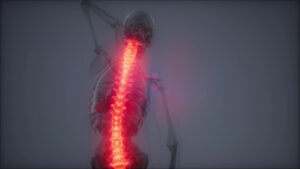Spine Injury Claims – How Much Compensation Am I Eligible For?
Have you suffered a spinal injury due to someone else’s negligence? If so, this guide to spine injury claims could help you.
Spinal injuries can have life-changing consequences and cause serious pain. You could be compensated for your suffering and the costs you may have paid to recover from your injury. Whether the incident occurred in the workplace, on the road or in a public space, a solicitor from our panel can help you to claim personal injury compensation.
In this guide you can read about different kinds of spinal injuries and whether you could be eligible to claim. It also provides examples of where and how a spine injury may occur, as well as outlining what the compensation covers. Finally, find out why you should claim and how a solicitor from our panel can help you through a No Win No Fee contract.
If you wish to enquire, you can get in touch with an advisor today. They can explain the services on offer in further detail and advise you on the next steps for your case. You can speak with them:
- Via telephone: 020 3870 4868
- Online by filling out the contact us form for a call back.
- Using the live chat on this page

Browse Our Guide
- What Is A Spinal Injury?
- Who Can Make Spinal Injury Claims?
- Claiming For A Serious Spinal Injury
- What Could My Compensation Cover?
- How Is Spinal Injury Compensation Calculated?
- Why Should I Make A Spinal Injury Claim?
- More Information
What Is A Spinal Injury?
The spine is a column of ring-shaped bones called vertebrae. It connects various parts of the body and provides support, so it must be strong but also flexible to allow movement. Additionally, the spine covers the spinal cord, which is a set of nerves that connects the brain to other nerves throughout the body.
Since the spine performs such an important function, spinal injuries can be very dangerous. They can be complete, meaning that the spinal cord cannot communicate with other nerves below the site of injury, or incomplete, where the spinal cord still has some ability to carry messages to other nerves. Continue reading for some examples.
Different Kinds Of Spinal Injuries
There are a range of spinal injuries that you could suffer with varying degrees of severity. These include:
- Slipped or fractured discs
- Compression of the spinal cord
- Tetraplegia/quadriplegia (paralysis affecting the use of arms and legs)
- Soft tissue injuries
- Broken or fractured bones/vertebrae
If your spinal injury has not been included, you can contact an advisor to discuss your injury in more detail.
Who Can Make Spinal Injury Claims?
In order for spine injury claims to be valid, a liable party’s actions or inactions must have been responsible for causing your injuries. There are situations in day-to-day life where a liable party has a legal obligation to take proper care to avoid careless actions or inactions that could cause foreseeable harm. This is known as a ‘duty of care’.
You can make a spinal injury claim if you can prove that:
- A person or organisation owed you a duty of care
- They did not fulfil their duty
- This caused you to injure your spine
In this section, we will provide details of some different situations that are typical of personal injury claims.
Accidents At Work
Your employer owes you a duty of care under the Health and Safety etc. Act 1974. This means that they must take reasonable steps to keep their employees safe from harm. Measures include performing risk assessments and regularly checking machinery. If your employer has failed in their duty and this has led you to suffer an injury, you may be able to claim compensation. Examples of workplace spinal injuries that you could claim for include:
- You are instructed to lift a box that is too heavy for one person to lift alone. Doing so causes a slipped disc in your back.
- You use a broken ladder to reach high shelving. The ladder breaks, and you fall on your back, causing a fracture.
If you have experienced a similar incident, you could be eligible to start an accident at work claim.
Public Place Accidents
Under the Occupier’s Liability Act 1957, the occupier of a space must ensure that their visitors are reasonably safe when using it. The occupier refers to the person or organisation in charge of the space. It is the occupier’s responsibility to make sure that the space is used for its intended purpose and that potential hazards are removed or limited where possible. You may be able to claim compensation if:
- When you enter a museum, you slip over on a wet floor and injure your back. There was no wet floor sign to warn you.
- You use a stairway in a cafe, but the handrail is loose. You fall down the stairs, breaking a bone in your spine.
In such instances, you could be able to claim for an accident in a public place.
Road Traffic Accidents
When using the road, you have a responsibility to other road users to avoid causing injury and damage. This includes drivers, pedestrians, motorcyclists, and cyclists. All must abide by the rules set out in the Highway Code and the Road Traffic Act 1988. Road traffic accidents where you could claim for a spinal injury include:
- A driver runs a red light and knocks you over as you are crossing the street. The impact fractures your spine.
- A driver is over the speed limit and cannot brake in time, meaning that they crash into the rear of your car. You suffer a spinal injury.
You can get in touch with an advisor today if you have experienced a road traffic accident.
Claiming For A Serious Spinal Injury
Spinal injury claims must be supported with compelling evidence. You must be able to show liability for your injuries.
Evidence may include:
- Photos or CCTV footage of the injury or incident
- Medical records or letters from a medical professional
- Copies of an accident report (if injured in a road traffic incident or a public space)
- Copies of the entry in workplace accident book (if injured while at work)
- Payslips or bank statements to help prove your out-of-pocket expenses
- Receipts (for home adjustments or medical expenses etc.)
If you’re unsure about what evidence you can provide for your personal injury claim, why not contact an advisor? They can assist you with advice that is specific to your situation.

What Could My Compensation Cover?
The effects of a spinal injury can be significant and far-reaching. Two types of damages could be included in your settlement (if you make a successful claim). General damages cover the pain and suffering that you have experienced due to the accident. This includes PTSD and mental health injuries caused by the incident.
You can also add special damages to your spinal injury claim. These refer to the costs incurred due to the spinal injury, such as:
- Lost earnings due to time taken off work
- Adaptations made to your home
- Travel costs
- Equipment that has become essential (such as a wheelchair)
- Medical costs
Could An Interim Payment Help Me?
If you need a compensation payout before the claim settles, you may wish to apply for an interim payment. This refers to a fraction of the compensation value that you can receive while the claim is still ongoing. You could request this in cases where:
- A judgement has been made to assess the damages owed by the defendant.
- The defendant has accepted liability for the payment of damages.
- It is certain that if a trial began, the claimant would receive damages.
You must provide a reason for requesting an interim payment. You may need it in order to cover:
- Cost of care
- Lost earnings due to time taken off work to recover from injury
- Rehabilitation costs (such as physiotherapy)
- Payment for adaptations made to your home
- Cost of travel to medical appointments
If you would like to enquire about interim payments, why not get in touch with an advisor?
How Is Spinal Injury Compensation Calculated?
The previous section discussed general damages, which can be assessed using the Judicial College guidelines (JCG). The list below provides compensation figures in relation to the varying types and severity of injuries.
Please note that these figures are not a guarantee of how much compensation you will receive for a spinal injury claim. They should only be used as a guide. You can contact an advisor for a free case assessment, as they can discuss the specific details of your case.
The first figure does not come from the JCG.
| Type of Injury | Severity | Compensation Guideline Amount |
|---|---|---|
| Multiple injuries with financial losses | Severe | Up to £1,000,000+ |
| Paralysis | Paraplegia | £267,340 to £346,890 |
| Back | Severe (i) | £111,150 to £196,450 |
| Severe (ii) | £90,510 to £107,910 | |
| Severe (iii) | £47,320 to £85,100 | |
| Moderate (i) | £33,880 to £47,320 | |
| Moderate (ii) | £15,260 to £33,880 | |
| Minor (i) | £9,630 to £15,260 | |
| Minor (ii) | £5,310 to £9,630 |
Who Pays For Adaptations Made To My Home?
If you have paid to make adaptations to your home in order to live with your injury, you can add the costs to your claim. This falls under special damages, which you can read about in a previous section. You will need to prove the costs incurred, so it is best to keep copies of your proof of payment.
As mentioned previously, you may also be eligible for an interim payment to pay for home adaptations. If you are still unsure, you can speak with an advisor about what costs can be recovered in spinal injury claims.
Why Should I Make A Spinal Injury Claim?
Spinal injuries can severely impact your physical and mental health, causing you to feel isolated. If your claim is successful, you can gain compensation for the undue pain and suffering that you have experienced.
Additionally, the compensation could help to pay for the support you need for your recovery. This includes costs such as treatment and rehabilitation, ensuring that you do not get lost in the system.
A solicitor from our panel can assess your claim for compensation and include the variety of costs that you may have incurred. You can contact an advisor today for more information and potentially start your claim.
No Win No Fee Solicitors
If you choose a solicitor from our panel to represent your claim for spinal injury compensation, they can offer you a No Win No Fee contract, such as a Conditional Fee Agreement (CFA). This would mean that you do not have to pay for your solicitor’s services:
- Before the claim starts
- Throughout the claim process
- If you are not successful in gaining compensation
You would only be required to pay if you are successful in gaining compensation, so you do not need to worry about the financial implications. This ‘success fee‘ is a legally capped percentage of the compensation that you pay to your solicitor.
You could be eligible to claim compensation, so why wait? Contact an advisor today with any queries about spinal injury claims:
- Via telephone: 020 3870 4868
- Online by filling out the contact us form for a call back.
- Using the live chat on this page

More Information
You can also:
- Sue for falling down the stairs at work.
- View our compensation tables for personal injury claims.
- Find out about claims for fractured bone compensation.
External resources:
- Check out the NHS webpage for back pain
- Find out if you could claim Statutory Sick Pay (SSP)
- Read the Health and Safety Executive (HSE) advice for back pain
Thank you for taking the time to read this guide about spinal injury claims. Get in contact today to start your personal injury claim.





